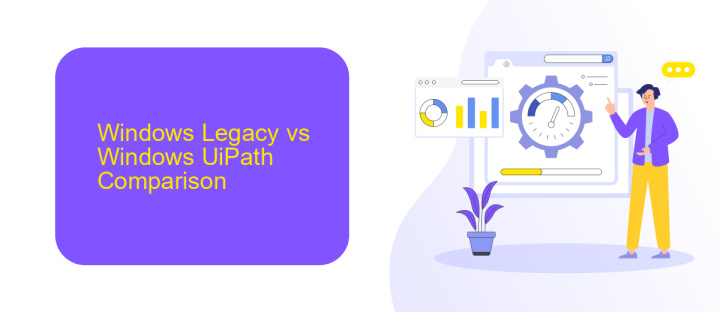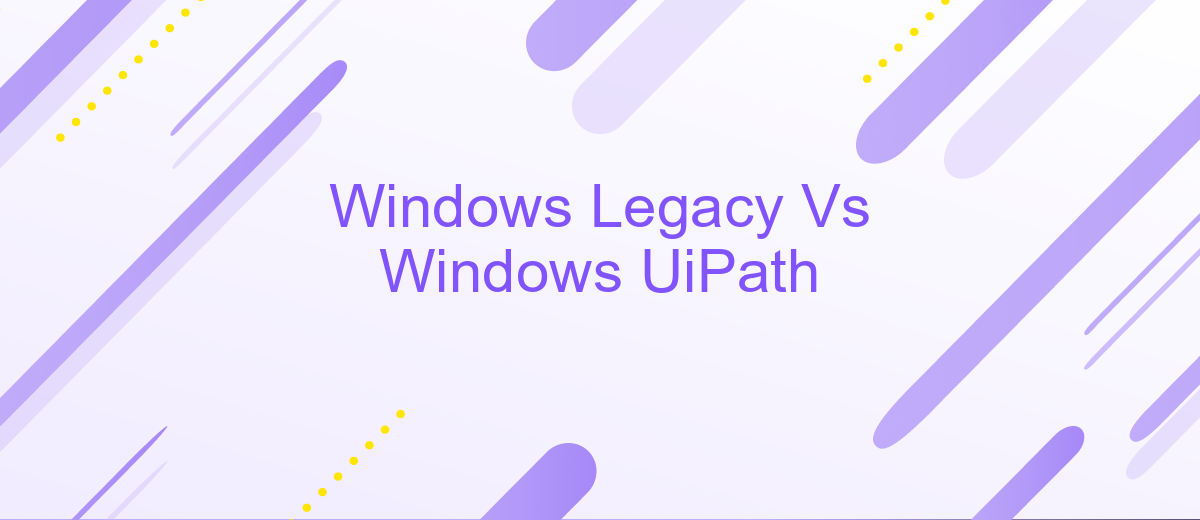Windows Legacy Vs Windows UiPath
In the ever-evolving landscape of automation and software development, the comparison between Windows Legacy systems and modern automation tools like UiPath is crucial. This article delves into the strengths and limitations of both, offering insights into how traditional Windows environments stack up against the innovative capabilities of UiPath in streamlining processes and enhancing productivity.
Introduction
In the ever-evolving landscape of software development and automation, understanding the distinctions between Windows Legacy and Windows UiPath is crucial. Windows Legacy refers to older systems and applications that have been in use for decades, often requiring significant maintenance and updates. On the other hand, Windows UiPath represents a modern approach to automation, leveraging cutting-edge technology to streamline processes and enhance productivity.
- Windows Legacy: Traditional systems with extensive history and established workflows.
- Windows UiPath: Contemporary automation platform designed for efficiency and scalability.
- Integration Tools: Services like ApiX-Drive facilitate seamless integration between various platforms.
As organizations strive to modernize their operations, the choice between maintaining legacy systems and adopting new automation solutions becomes pivotal. Tools like ApiX-Drive play a significant role in this transition, offering robust integration capabilities that bridge the gap between old and new technologies. This comparison will delve into the advantages and challenges of each approach, providing insights to help you make informed decisions for your business needs.
Windows Legacy vs Windows UiPath Comparison

Windows Legacy has been a cornerstone for many enterprises, offering a stable and familiar environment for business operations. However, it often requires manual intervention and lacks the advanced automation capabilities that modern businesses demand. This is where Windows UiPath comes into play. UiPath leverages robotic process automation (RPA) to streamline repetitive tasks, reducing human error and increasing efficiency. With UiPath, businesses can automate workflows, making processes faster and more reliable.
While Windows Legacy provides a robust foundation, Windows UiPath elevates operational efficiency through advanced automation. For instance, integrating various applications and services becomes seamless with UiPath. Tools like ApiX-Drive further enhance this capability by allowing easy integration between different software solutions, streamlining data flow and communication. In summary, while Windows Legacy offers stability, Windows UiPath, complemented by services like ApiX-Drive, provides the automation and integration required for modern business needs.
Advantages and Disadvantages

When comparing Windows Legacy and Windows UiPath, it's essential to consider both their advantages and disadvantages. Windows Legacy, being an older system, offers a familiar interface and stability that many long-time users appreciate. However, it lacks modern features and may have compatibility issues with newer applications.
- Advantages of Windows Legacy: Stability, familiar interface, and extensive documentation.
- Disadvantages of Windows Legacy: Outdated features, potential compatibility issues, and limited support for newer technologies.
- Advantages of Windows UiPath: Modern interface, advanced automation capabilities, and better integration with contemporary applications.
- Disadvantages of Windows UiPath: Steeper learning curve, potential higher costs, and dependency on regular updates.
For businesses looking to streamline their processes, integrating services like ApiX-Drive can be highly beneficial. ApiX-Drive simplifies the integration of various applications, making it easier to automate workflows and improve efficiency. Ultimately, the choice between Windows Legacy and Windows UiPath depends on the specific needs and resources of the user.
Use Cases

Windows Legacy and Windows UiPath both offer unique advantages for different use cases. Windows Legacy is often preferred for traditional desktop applications that require stability and compatibility with older software. On the other hand, Windows UiPath excels in automating repetitive tasks, making it ideal for modern business processes.
For instance, Windows Legacy is commonly used in industries where long-term support and reliability are crucial, such as healthcare and finance. Conversely, Windows UiPath is widely adopted in sectors that prioritize efficiency and automation, like retail and logistics.
- Windows Legacy: Ideal for maintaining legacy systems and running older applications.
- Windows UiPath: Best for automating workflows and integrating with modern APIs.
- ApiX-Drive: Facilitates seamless integration between Windows UiPath and other business applications.
In summary, the choice between Windows Legacy and Windows UiPath largely depends on the specific needs of your organization. For those looking to integrate various services and automate processes, tools like ApiX-Drive can provide significant advantages. Ultimately, understanding the strengths of each platform will help in making an informed decision.
Conclusion
In comparing Windows Legacy and Windows UiPath, it becomes evident that each has its distinct advantages and use cases. Windows Legacy offers a tried-and-true environment where traditional applications and workflows can operate seamlessly. It is particularly suited for environments where stability and long-term support are crucial. On the other hand, Windows UiPath brings a modern approach to automation, enabling businesses to streamline processes through advanced robotic process automation (RPA) capabilities, making it ideal for dynamic and evolving business needs.
For organizations looking to integrate various systems and automate workflows efficiently, leveraging services like ApiX-Drive can be incredibly beneficial. ApiX-Drive simplifies the integration process, allowing for seamless connectivity between different applications and services. This enhances the functionality of both Windows Legacy and Windows UiPath, providing a more cohesive and efficient operational environment. Ultimately, the choice between Windows Legacy and Windows UiPath should be guided by the specific needs and goals of the organization, with a consideration for future scalability and technological advancements.


FAQ
What are the key differences between Windows Legacy and Windows UiPath?
Can I use Windows UiPath on older versions of Windows Legacy?
How can I integrate Windows UiPath with other applications and services?
Is there a difference in security between Windows Legacy and Windows UiPath?
What are the benefits of using Windows UiPath for business automation?
Apix-Drive will help optimize business processes, save you from a lot of routine tasks and unnecessary costs for automation, attracting additional specialists. Try setting up a free test connection with ApiX-Drive and see for yourself. Now you have to think about where to invest the freed time and money!

